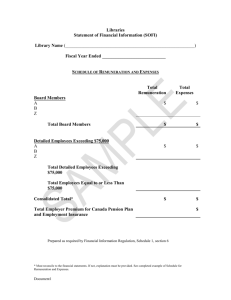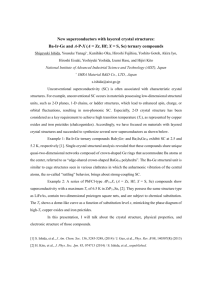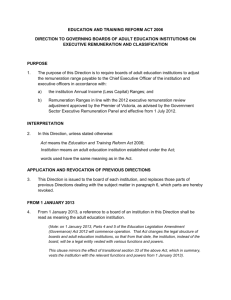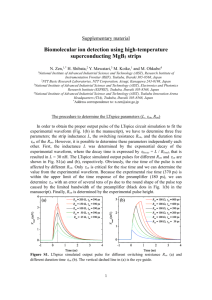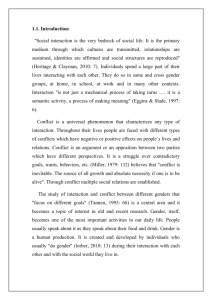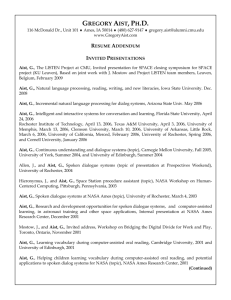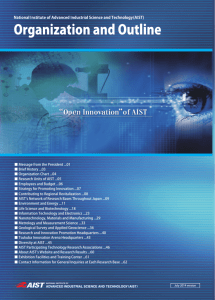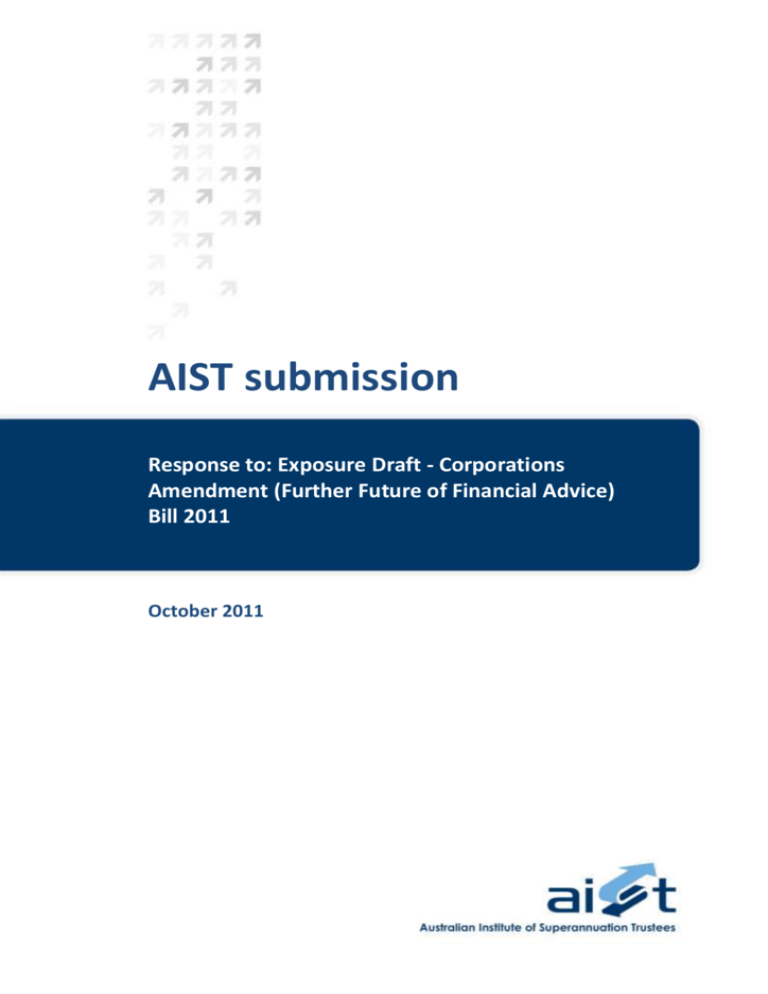
AIST submission
Response to: Exposure Draft - Corporations
Amendment (Further Future of Financial Advice)
Bill 2011
October 2011
Response to: Exposure Draft – Corporations Amendment
(Further Future of Financial Advice) Bill 2011
Background
On 26 April 2010, the then Minister for Financial Services, Superannuation and Corporate Law, the
Hon Chris Bowen MP, announced the Future of Financial Advice (FOFA) reforms. The FOFA reforms
represent the Government’s response to the 2009 Inquiry into Financial Products and Services in
Australia by the Parliamentary Joint Committee on Corporations and Financial Services (PJC Inquiry),
which considered a variety of issues associated with corporate collapses, including Storm Financial
and Opes Prime.
The Corporations Amendment (Further Future of Financial Advice Measures) Bill 2011 (“the Bill”)
implements the FOFA reforms. The first tranche of legislation (Corporations Amendment (Future of
Financial Advice) Bill 2011) covered the best interests obligation, the client agreement requirements
for ongoing fees and enhancement of ASIC’s powers with respect to licensing and banning.
The first tranche was introduced to the House of Representatives on 13 October not including the
best interests obligations which will appear in a separate bill.
The second tranche of legislation is set out in this Bill, which is designed to set up the following
framework:
A ban on conflicted remuneration (including product commissions), where licensees or their
representatives provide financial product advice to retail clients;
A ban on volume-based shelf-space fees from asset managers or product issuers to platform
operators; and
A ban on asset-based fees on geared funds.
The reforms focus on the framework for the provision of financial advice. The underlying objective
of the reforms is to improve the quality of financial advice while building trust and confidence in the
financial planning industry through enhanced standards which align the interests of the adviser with
the client and reduce conflicts of interest.
The Explanatory Memorandum (“the EM”) to the Bill also discusses potential new additions to the
Corporations Regulations 2001 (“the regulations”, “the regs”).
Additional reforms yet to be drafted include:
Replacement for the exemption currently available to accountants from the provisions of
AFSL licensing;
Definition of the term “financial planner”;
Details of the carve-out of volume based fees associated with capital raisings and other
corporate actions undertaken by stockbrokers;
Grandfathering arrangements for existing clients of financial advisers where there are
ongoing fee or commission arrangements; and
Scaled and intra-fund advice provisions.
©Copyright 2011 Australian Institute of Superannuation Trustees (AIST).
All rights reserved. You may use this material for your personal, non-commercial use. Any other use of this
content requires written consent from AIST.
Page | 2
Response to: Exposure Draft – Corporations Amendment
(Further Future of Financial Advice) Bill 2011
AIST
The Australian Institute of Superannuation Trustees (AIST) is an independent, not-for-profit
professional body whose mission is to protect the interests of Australia’s $450 billion not-for-profit
superannuation sector. AIST’s members are the trustee directors and staff of industry, corporate
and public-sector superannuation funds, who manage the superannuation accounts of two-thirds of
the Australian workforce.
AIST is a registered training organisation and has recently expanded its education program to
encompass the growing and changing needs of all members of the not-for-profit superannuation
sector.
AIST offers a range of services including compliance and consulting services, events - both national
and international - as well as member support. AIST also advocates on behalf of its members to
relevant stakeholders.
AIST has recently undergone a vast overhaul, elevating its status as a professional institute to further
benefit our members. AIST has introduced a new department – Trustee Governance and
Professional Standards – responsible for implementing industry policies and developing a
comprehensive framework for the not-for-profit sector.
AIST’s services are designed to support members in their endeavour to improve the superannuation
system and build a better retirement for all Australians.
Contact
Fiona Reynolds
CEO
03 8677 3800
Tom Garcia
Policy and Regulatory Manager
03 8677 3804
©Copyright 2011 Australian Institute of Superannuation Trustees (AIST).
All rights reserved. You may use this material for your personal, non-commercial use. Any other use of this
content requires written consent from AIST.
Page | 3
Response to: Exposure Draft – Corporations Amendment
(Further Future of Financial Advice) Bill 2011
1 Executive Summary
AIST strongly supports the intent of the reforms to be implemented by the Exposure Draft (“the
ED”). We consider the conflicted remuneration measures to be a major new paradigm in financial
advice, where advice provided to members is the primary focus.
With respect to the features proposed in this tranche, we make the following recommendations:
AIST would support these measures being extended beyond retail investors;
The definition of conflicted remuneration from employers to employees should not be
limited to volume payments;
Licensees should be liable for payment of conflicted remuneration, not just for receipt;
Scale-based discounts must be passed on to investors in all instances;
The term ‘reasonable value of scale efficiencies’ should be tightly defined in the Bill;
The requirement that professional development must be provided in Australia or New
Zealand precludes licensees or their representatives from learning about best practice and
new developments in the global financial services industry;
No further concessions should be made to commissions from life insurance premiums as
these are already unacceptable;
AIST recommends release of the grandfathering provisions for discussion immediately to
enable informed discussion on other tranches of legislation;
Civil penalties should apply where an adviser may have an incentive to deliberately neglect
their client base; and
The commencement date for this Bill should be brought forward to the date of Royal Assent
to prevent abuse of fee or commission arrangements that will be grandfathered.
AIST also recommends that an end date be provided to the grandfathering arrangements and
considers 1 July 2017 to be entirely appropriate for this to coincide with the end of the MySuper
transition. AIST supports all other proposals in this Bill.
©Copyright 2011 Australian Institute of Superannuation Trustees (AIST).
All rights reserved. You may use this material for your personal, non-commercial use. Any other use of this
content requires written consent from AIST.
Page | 4
Response to: Exposure Draft – Corporations Amendment
(Further Future of Financial Advice) Bill 2011
2 Commentary and recommendations
AIST supports the intent behind these measures. We broadly welcome the context of where these
obligations are to apply, as well as the situations to which these measures apply. We also consider
strongly that these measures constitute much needed consumer protection.
2.1 Note to this submission
Unless otherwise indicated, please note that all section and subsection numbers referred to
throughout this submission refer to those used to number the proposed new or amended sections
of the Corporations Act 2001 (“the Act”) as described in the ED and not those of the ED itself.
2.2 The new financial paradigm
AIST continues to broadly support the Future of Financial Advice (FOFA) initiatives, and those that
deal with conflicted remuneration specifically. AIST has long supported the notion that although
financial products recommended by advisers are historically regarded as “the product” in the
financial world, we believe that this is not appropriate.
AIST considers that it is more appropriate that “the product” in financial services should refer to the
advice provided by financial advisers. In this context, financial products (as defined in the Act)
themselves should be used to supplement or to execute the advice and the quality of “the product”
should not be influenced by inappropriate pressures.
Conflicted remuneration can be considered an inappropriate pressure and AIST supports any
measure in implementing a paradigm where advice is central, rather than incidental.
AIST applauds efforts to reduce conflicted remuneration along the value chain. We note that there
are a significant number of relationships addressed in this Bill, but are concerned that some of the
relationships are treated unequally or are not covered, e.g. the carve-out of stockbroking
commissions where such arrangements relate to advice provided during capital raisings and other
corporate actions.
2.2.1
Proposed section 963 – Retail clients
Although not within the scope of this measure, AIST supports good consumer protection measures
being made available to all investors, regardless of their level of sophistication or of how much
money that they have to invest. For this reason, we would support the ban on conflicted
remuneration being extended beyond retail clients.
©Copyright 2011 Australian Institute of Superannuation Trustees (AIST).
All rights reserved. You may use this material for your personal, non-commercial use. Any other use of this
content requires written consent from AIST.
Page | 5
Response to: Exposure Draft – Corporations Amendment
(Further Future of Financial Advice) Bill 2011
2.2.2
Proposed section 963C – Payments by employers not conflicted remuneration
We note that under the proposed section 963C, ordinary payments for work carried out is only
considered conflicted remuneration if it satisfies the criteria contained within proposed subsection
963(2). Consider the following example:
Example
Boris is a financial adviser who works for Bruce. In Boris’ key performance indicators (KPIs), he is
required to:
Consider recommending Acme Equity Fund/Option in all advice provided to clients ahead of
other similar funds or investment options.
Meeting this KPI requires Boris to actively note in fact finds/financial needs analyses or supporting
documentation that he has considered the product prior to other similar products/options. At the
end of the year, Boris is able to demonstrate that he has met this KPI and qualify for a bonus.
Since volumes sold are not a consideration, this arrangement would be allowed to continue, as it
does not breach any of subsection 963(2).
We consider that this is flawed, as clearly bonuses of this nature fall within the scope of the
proposed subsection 963(1).
To ensure that this situation does not arise, we recommend that the proposed subsection
963C(1)(a)(ii) be reworded to ensure that it refers to all of the proposed section 963, not just
subsection (2).
2.2.3
Proposed sections 963D and 963E – Licensee obligations
We note that the proposed section 963D prohibits the acceptance of conflicted remuneration by
licensees, and that proposed section 963E obliges licensees to take reasonable steps to ensure that
representatives do not accept conflicted remuneration. However, we cannot find a section that
prohibits payment of such remuneration by licensees, unless the licensee is either the employer of a
recipient (covered in proposed section 963H), or the licensee responsible for an authorised
representative who is a recipient (covered in proposed section 963E).
Whilst we accept that it is fair and reasonable to outlaw the receipt of such payments by licensees,
their representatives (including authorised representatives) and employees who are either licensees
or representatives of licensees, we believe that such bans should be extended to those who make
these payments as well.
©Copyright 2011 Australian Institute of Superannuation Trustees (AIST).
All rights reserved. You may use this material for your personal, non-commercial use. Any other use of this
content requires written consent from AIST.
Page | 6
Response to: Exposure Draft – Corporations Amendment
(Further Future of Financial Advice) Bill 2011
Example
Jill is an authorised representative of Star Financial Planning (“Star”). Star does not issue financial
products, as defined by the Corporations Act 2001, but they do provide a number of back office
services to Jill. Jill prefers not to use Star’s paraplanning and tends to use Ace Financial Services’
(“Ace”) paraplanning service, mostly. Both Ace and Star are AFS licensees and are unrelated
companies.
Jill is aware that it is Ace’s policy to recommend Beta Financial Management (“Beta”) products by
default, unless Jill instructs them otherwise. Beta is both a product issuer and is not related to Ace
or Star.
In 2013, Ace provides Jill with a new Apple iPad 5 which it says is a bonus for requesting more than
30 statements of advice during the 2012 calendar year. The iPad 5 retails for $700. Ace tells Jill that
she should be OK to accept the iPad, as a paraplanning service is not a financial product.
Jill is concerned that this is conflicted remuneration under subsection 963(1) because of the Star
products default, and believes that she may be in breach of subsection 963F(1) in accepting the iPad,
and doesn’t believe that relying on Ace statement is reasonable under subsection 963F(2).
Star believes that Jill may have breached section 963F as they do not consider the iPad to be
appropriate and are concerned that if ‘reasonable steps’ aren’t taken to avoid this breach, they will
have breached section 963E.
Ace has no concerns whatsoever: As far as they are concerned, acceptance of the gift is entirely
Star’s or Jill’s issue.
We believe that not making licensees liable for the payment of conflicted remuneration to third
parties is an oversight and is unfair, given that representatives and their licensees and/or their
employers are liable for the receipt of these amounts. To ensure that licensees do not provide
conflicted remuneration, we believe that this could be easily fixed by strengthening the proposed
section 964 to ban licensees, rather than product issuers from paying conflicted remuneration in all
other instances, and that civil penalties should apply.
©Copyright 2011 Australian Institute of Superannuation Trustees (AIST).
All rights reserved. You may use this material for your personal, non-commercial use. Any other use of this
content requires written consent from AIST.
Page | 7
Response to: Exposure Draft – Corporations Amendment
(Further Future of Financial Advice) Bill 2011
2.3 Exemptions and unintended consequences
AIST has concerns about exemptions to the ban that may lead to unintended consequences. We
have identified some of these in the section to follow.
2.3.1
Scale-based discounts
It is AIST’s opinion that where these scale-based discounts or rebates are genuine and provided in
accordance with the proposed section 964B, such discounts or rebates must be passed on to
customers in all instances. To do otherwise can only raise additional questions about the nature and
transparency of such arrangements.
We also consider that the criterion of not exceeding ‘reasonable value of scale efficiencies’ as
described in the proposed subsection 964B(2)(b) is vaguely defined and open to abuse and that this
term must be tightly defined in this Bill, or in the Regulations.
Lastly, we note that it is proposed at sections 964C and 964D that financial services and RSE
licensees may not accept shelf-space fees, however there is no ban on the payment of such
amounts. For the same reasons as we considered previously, we consider that there should be a
ban on licensees paying shelf-space fees in the interests of fairness. Civil penalties should apply to
such a prohibition.
2.3.2
Professional development
AIST supports the exemption proposed at subsection 963B(c), where benefits with a genuine
education or training purpose that is relevant to providing financial advice and compliant with the
Regulations are not considered to be conflicted remuneration. We also agree with most of the
planned restrictions on this exemption, including the proposed majority time requirement and the
proposed expenses requirement that are cited in the second and third dot points of paragraph 1.34
of the EM.
However, to require that professional development must be provided in Australia or New Zealand
precludes licensees or their representatives from learning about best practice and new
developments in the global financial services industry. (First dot point, paragraph 1.34, the EM).
Example
Trang is an adviser with and representative of the Widget Industry Superannuation Trust (WIST), an
AFS and RSE licensee. Trang provides a personal advice service to WIST’s members, and only has the
WIST product on her approved product list.
WIST would like to pay for and send Trang to a conference in the USA on new financial advice
technologies and associated member services only available in the USA. However, after reading the
Regulations, they realise that, unless the conference is held in Australia or New Zealand, such a
conference may be considered to be conflicted remuneration. They are unable to send Trang or any
of their advisers.
©Copyright 2011 Australian Institute of Superannuation Trustees (AIST).
All rights reserved. You may use this material for your personal, non-commercial use. Any other use of this
content requires written consent from AIST.
Page | 8
Response to: Exposure Draft – Corporations Amendment
(Further Future of Financial Advice) Bill 2011
2.3.3
Life insurance
AIST refers back to the fourth recommendation made by the Ripoll enquiry, where:
The committee recommends that the government consult with and support industry in
developing the most appropriate mechanism by which to cease payments from product
manufacturers to financial advisers.
We note that the government supported this in their response of 26 April 2010. Since that time the
measures have changed to, firstly, allow commissions to be paid on non-super life insurance
premiums, then, allowing them on all individual risk insurance premiums, inside and outside of super
except for default arrangements.
We strongly recommend against any further watering down of provisions that go against the grain of
the Ripoll Report’s original findings. There cannot be any further changes to the planned bans on
commissions on group insurance within superannuation, or the ban on commissions on insurance
arrangements that are part of default super arrangements. We consider that the concessions that
have already been made to allow commissions on individual policies to be unacceptable and
therefore recommend that no further changes be made to the Bill.
©Copyright 2011 Australian Institute of Superannuation Trustees (AIST).
All rights reserved. You may use this material for your personal, non-commercial use. Any other use of this
content requires written consent from AIST.
Page | 9
Response to: Exposure Draft – Corporations Amendment
(Further Future of Financial Advice) Bill 2011
2.4 Grandfathering
We are aware that the proposed grandfathering arrangements are yet to be released. We are
concerned that our submissions to date may be misinformed due to the absence of information.
We strongly recommend that these arrangements are released for consultation in the next tranche
of legislation to enable proper comment.
2.4.1
Deliberate neglect
It is anticipated that existing fee and commission arrangements that relate to existing clients will be
grandfathered. We wish to point out circumstances whereby clients of financial advisers could be
deliberately neglected, where an adviser could decline to provide any advice to a client if there is the
chance that existing fees and/or commissions could be extinguished. Furthermore, we believe that
advisers may not attempt to proactively initiate future advice with their clients for the same reasons.
It is planned that the bans on conflicted remuneration will only be prospective, that is, it will only
apply to arrangements where new advice is provided on or after 1 July 2012. We wish to draw
attention to the definition of the term financial advice, generally defined at subsection 766B(1) of
the Act as follows:
For the purposes of this Chapter, financial product advice means a recommendation or a
statement of opinion, or a report of either of those things, that:
a. is intended to influence a person or persons in making a decision in relation to a
particular financial product or class of financial products, or an interest in a
particular financial product or class of financial products; or
b. could reasonably be regarded as being intended to have such an influence.
We note that the Australian Securities and Investments Commission (ASIC) presently consider advice
that satisfies this description can include even minor recommendations of a non-financial nature,
such as the nomination of beneficiaries on a superannuation interest. (ASIC Consultation Paper CP
164)
Therefore, any existing commission arrangements must come to an end if any new advice is
provided (for that product) and existing ongoing fee arrangements will be subject to the ‘opt-in’
provisions that are contained in the Corporations Amendment (Future of Financial Advice) Bill 2011
presently before Parliament.
AIST believes that such a situation cannot be allowed to arise and believe that civil penalties must
apply where an adviser deliberately neglects their client-base.
©Copyright 2011 Australian Institute of Superannuation Trustees (AIST).
All rights reserved. You may use this material for your personal, non-commercial use. Any other use of this
content requires written consent from AIST.
Page | 10
Response to: Exposure Draft – Corporations Amendment
(Further Future of Financial Advice) Bill 2011
2.4.2
Incentives to enter into conflicted remuneration arrangements
A similar problem could arise due to the time-lapse between Royal Assent for these provisions and
the anticipated commencement date of 1 July 2012.
This period could be overly long and advice providers could feasibly utilise this period to transfer
existing clients into arrangements that will be grandfathered. Further, advisers may have an
incentive to negotiate unconscionable fee and/or commission arrangements for any new advice
provided during this period prior to the commencement date.
We strongly recommend that the commencement date be brought forward to the Royal Assent date
for this reason.
2.4.3
Ending low value arrangements
With respect to the proposed grandfathering arrangements, AIST would support that these are
transitional and recommend that they be given an end date. A logical date would be the end of the
MySuper transition period being 1 July 2017. We are not aware of any reasons whatsoever why
clients in existing fee/commission arrangements could be conceptually different from default
superannuation investors.
©Copyright 2011 Australian Institute of Superannuation Trustees (AIST).
All rights reserved. You may use this material for your personal, non-commercial use. Any other use of this
content requires written consent from AIST.
Page | 11

